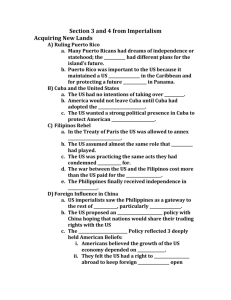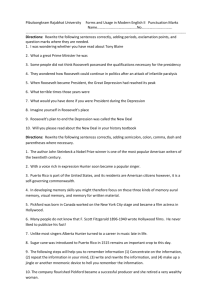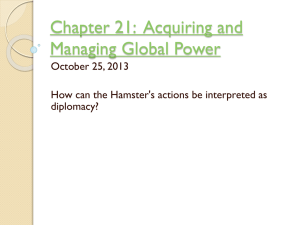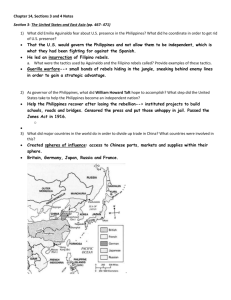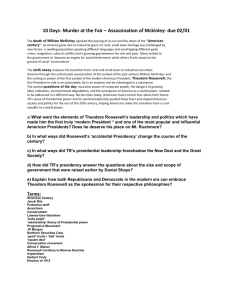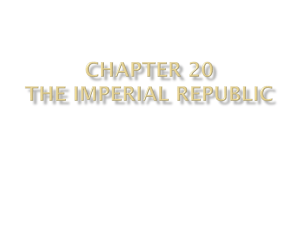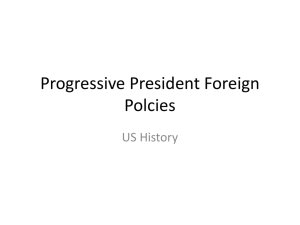Multiple-Choice Questions - Chapter 22 1. President Grover
advertisement
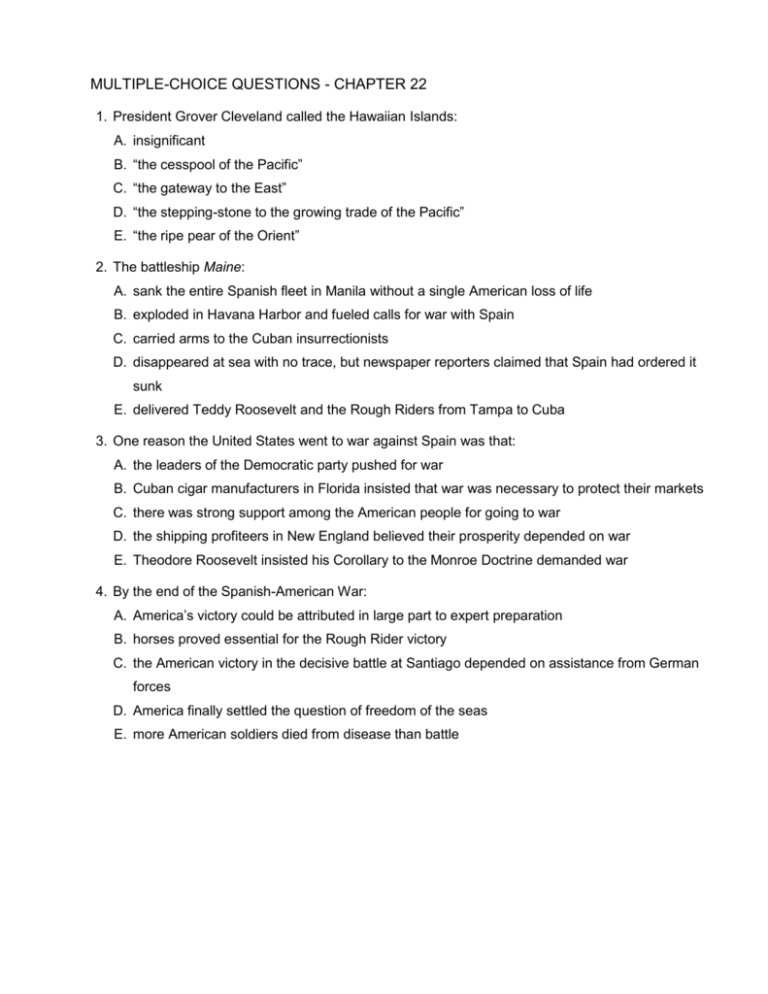
MULTIPLE-CHOICE QUESTIONS - CHAPTER 22 1. President Grover Cleveland called the Hawaiian Islands: A. insignificant B. “the cesspool of the Pacific” C. “the gateway to the East” D. “the stepping-stone to the growing trade of the Pacific” E. “the ripe pear of the Orient” 2. The battleship Maine: A. sank the entire Spanish fleet in Manila without a single American loss of life B. exploded in Havana Harbor and fueled calls for war with Spain C. carried arms to the Cuban insurrectionists D. disappeared at sea with no trace, but newspaper reporters claimed that Spain had ordered it sunk E. delivered Teddy Roosevelt and the Rough Riders from Tampa to Cuba 3. One reason the United States went to war against Spain was that: A. the leaders of the Democratic party pushed for war B. Cuban cigar manufacturers in Florida insisted that war was necessary to protect their markets C. there was strong support among the American people for going to war D. the shipping profiteers in New England believed their prosperity depended on war E. Theodore Roosevelt insisted his Corollary to the Monroe Doctrine demanded war 4. By the end of the Spanish-American War: A. America’s victory could be attributed in large part to expert preparation B. horses proved essential for the Rough Rider victory C. the American victory in the decisive battle at Santiago depended on assistance from German forces D. America finally settled the question of freedom of the seas E. more American soldiers died from disease than battle 5. A major reason that the U.S. annexed the Philippines despite anti-imperialist opposition in the U.S. was because: A. Filipino leader Emilio Aguinaldo requested annexation B. the islands were located very close to China and China’s potential markets C. anti-imperialist William Jennings Bryan agreed to become the civil governor of the territory D. Americans wanted to avenge their defeat in the Philippine-American War E. the Philippines offered the largest and most developed untapped market in the entire Eastern Hemisphere 6.Protestant missionaries and supporting organizations often supported American imperialism because they: A. envisioned being appointed to positions of political leadership in the new colonies B. respected the Catholicism of the majority of residents who lived in Spain’s former territories C. believed the United States had much to learn from the “barbaric” peoples of the world D. thought that war was good E. believed in the global superiority of the Anglo-Saxon “race” 7. Why were American Catholics troubled by Protestant efforts to evangelize in Spain’s former colonies? A. They believed that the peoples of the Caribbean and the Pacific were ill-suited to Christianity. B. The people of those territories were already Christians who belonged to the Catholic Church. C. They thought that the people of these predominantly atheist lands should be converted to Catholicism. D. Protestants, the Catholics insisted, were not Christians. E. Protestants pretended to be Catholics in order to gain more converts. 8. The United States acquired all of the following as a result of the Spanish-American War EXCEPT: A. Puerto Rico B. Panama C. Guam D. the Philippines E. Guantánamo Bay 9.The Platt Amendment did all of the following EXCEPT: A. sharply restrict Cuba’s independence B. provide for the American annexation of Cuba C. become part of the Cuban constitution D. prohibit Cuba from impairing its independence by signing a treaty with a third power E. lead to the establishment of the U.S. naval base at Guantánamo Bay 10. Which of the following statements about the American acquisition of Puerto Rico is true? A. The Foraker Act of 1900 eliminated the island’s government. B. Puerto Rico was denied the right to have an elected legislature. C. Puerto Rico had little strategic value to the United States. D. The Jones Act of 1917 made residents of Puerto Rico U.S. citizens. E. Puerto Rico became a U.S. state. 11. The Boxer Rebellion took place in: A. Japan B. Morocco C. Colombia D. Panama E. China 12. Why was Theodore Roosevelt picked as William McKinley’s running mate for the 1900 election? A. To prevent William Jennings Bryan from picking Roosevelt. B. Roosevelt’s calm and conservative approach to politics nicely balanced McKinley’s more radical inclinations. C. McKinley was secretly suffering from a fatal disease, and Republican leaders wanted Roosevelt to succeed him. D. Roosevelt was a popular figure from his exploits in the Spanish-American War and had been a strong public supporter of McKinley. E. Roosevelt needed a job. 13. Who was president when the United States acquired the right to build a canal across Panama? A. Grover Cleveland B. William Jennings Bryan C. William McKinley D. Woodrow Wilson E. Theodore Roosevelt 14. In order to acquire the Canal Zone, the United States supported Panama’s revolt against: A. Mexico B. Venezuela C. Colombia D. Costa Rica E. Nicaragua 15. As a result of Japan’s show of strength in the Russo-Japanese War: A. America was quick to send money and support troops to aid Russia B. Congress voted financial and military aid to Korea to help prevent a Japanese invasion of the Korean peninsula C. Congress lifted the limitations it had previously set on Japanese immigration D. Americans began to doubt the security of the Philippines E. Americans cut a deal with Korea to protect the Open Door 16. The “yellow peril” was: A. mosquito-borne disease B. a late-nineteenth-century style of politically influential journalism C. a racially charged description of a perceived threat from Japan D. a racially charged description of Panama E. tuberculosis 17. Why did Theodore Roosevelt send the “Great White Fleet” on a world tour between 1907 and 1909? A. to conquer new colonial territories for the U.S. B. to fight the Japanese effort to conquer the Philippines C. to demonstrate that the U.S. had arrived as a world power D. to defeat the Boxer Rebellion in Peking E. to avenge the surprise Russian attack on U.S. forces in Manila Bay 18. The Act of Algeciras did all of the following EXCEPT: A. affirm the independence of Morocco B. guarantee an open door for trade in Morocco C. provide for the training of Moroccan police D. legalize the Roosevelt Corollary to the Monroe Doctrine E. help Roosevelt win the Nobel Peace Prize
